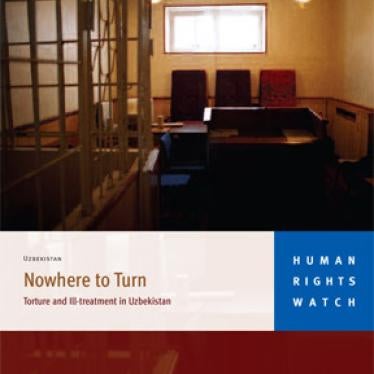The Uzbek government should urgently implement recommendations to combat torture issued by the United Nations Committee Against Torture, Human Rights Watch said today.
Human Rights Watch called on Uzbekistan’s international partners to make the implementation of the committee’s recommendations a priority in their relations with the Uzbek government.
“The committee’s conclusions provide an important tool that Uzbekistan’s international partners should use to bring about positive change,” said Holly Cartner, Europe and Central Asia director at Human Rights Watch. “Getting the Uzbek government to end the use of torture should become a key component of international dialogue with Tashkent.”
The committee – among the world’s foremost authorities on torture – scrutinized Uzbekistan’s torture record earlier this month, during its periodic review of that country’s compliance with the UN Convention against Torture. Uzbekistan became a party to the convention in 1995. The committee issued the resulting concluding observations at the conclusion of its three-week session in Geneva, which ended today.
The committee’s conclusions noted a handful of positive steps the Uzbek government has taken, including passing legislation abolishing the death penalty and introducing habeas corpus (judicial review of detention). But the bulk of the document – six of nine pages – expressed a range of serious concerns about what the committee termed “[n]umerous, ongoing and consistent allegations concerning routine use of torture […] committed by law enforcement and investigative personnel or with their instigation or consent,” and “[f]ailure to conduct prompt and impartial investigations into such allegations.”
The committee called on the Uzbek government to “apply a zero-tolerance approach to the continuing problem of torture, and to the practice of impunity,” and detailed numerous urgent measures the Uzbek authorities should take to address the concerns identified, including:
- “Publicly and unambiguously condemn practices of torture in all its forms” and make clear that such acts will not go unpunished;
- Ensure “in practice prompt, impartial and effective investigations”, by “a fully independent body,” into “all allegations of torture and ill-treatment and the prosecution and punishment of those responsible”;
- Ensure “in practice that complainants and witnesses are protected” against retribution as a result of bringing torture complaints;
- Ensure “in practice that each detainee can implement the right to access a lawyer, independent doctor and family member and other legal guarantees to ensure protection from torture”;
- Ensure that “in practice evidence obtained by torture may not be invoked as evidence in any proceedings”;
- Ensure “fully independent monitoring of detention and other custodial facilitates” by “independent and impartial national and international experts and non-governmental organizations in accordance with their standard methodologies.”
The committee further expressed concern about the Uzbek government crackdown on civil society and called on the authorities to “take all necessary measures to ensure that independent human rights monitors are protected from unjust imprisonment, intimidation or violence as a result of their peaceful human rights activities.”
Joining other actors of the international community, most notably the European Union, the committee called for the “release [of] human rights defenders imprisoned and/or sentenced because of their peaceful professional activities,” and asked the Uzbek government to “facilitate the reopening and full functioning of independent national and international human rights organizations, including the possibility of conducting unannounced independent visits to places of detention and confinement.”
The committee also called for “a full, effective, impartial inquiry” into the May 2005 massacre in Andijan where Uzbek government forces killed hundreds of mostly unarmed demonstrators. Further on the Andijan events, the committee noted “with concern” the government’s “failure to conduct full and effective investigations into all claims of excessive force by officials,” and the fact that it had “limited and obstructed independent monitoring of human rights in the aftermath of these events, thereby further impairing the ability to obtain a reliable or credible assessment of the reported abuses, including ascertaining information on the whereabouts and reported torture or ill-treatment of persons detained and/or missing.”
The committee also highlighted for particular concern “reports of forcible return of recognised refugees and/or asylum seekers from neighbouring countries” and the lack of information about their “conditions, treatment and whereabouts” in Uzbekistan. It called on the Uzbek government to allow the United Nations High Commissioner for Refugees – which it expelled in March 2006 – to return to the country.
“The committee’s conclusions make clear just how much remains to be done before the Uzbek government can claim to have addressed its torture problem,” said Cartner. “Tashkent should now engage in a genuine and urgent effort to implement all of the committee’s recommendations.”
A 90-page report by Human Rights Watch, published on the eve of the review, documents widespread torture in the Uzbek criminal justice system that goes largely unpunished. The report, based on two years of research and the testimonies of more than 30 torture victims and their relatives, belies Uzbek government claims of progress and details the cycle of abuse that starts at the time of an individual’s detention and continues through conviction or beyond to compel confessions or other testimony. It shows that torture and ill-treatment are ignored and overlooked by investigators, prosecutors, and judges, and generally hushed up by the media and the government.







